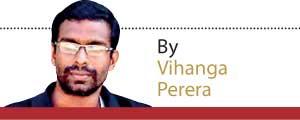Reply To:
Name - Reply Comment
Carl Muller, who passed away in December 2019, was – is – the most original contributor Sri Lankan English fiction has had over the past three decades. Sometimes, we feel that there are
|
Carl Muller |
certain books a writer shouldn’t have written, or that he should have stopped writing at a particular point. A purely un-academic conjecture of a reader alone, if this assessment is to be applied to Carl Muller, he shouldn’t have published the sequels to Children of the Lion (1997): a series of supplements published soon after the War, which fail to live up to the mark a sequel to such an energy-consuming mammoth of a project such as Children of the Lion demands. Feeding the hunger-pangs of a triumphalist, immediate post-war majoritarian nationalism, these sequels – The City of the Lion and the Grandeur of the Lion included – if at all complicate Carl Muller as a person who began his writing career by bringing back to the center stories of a people that were fast disappearing from Sri Lanka’s post-independence universe: the working class Burghers.
Children of the Lion is something else: palpably ambiguous, part-mischievous, and often with very thin lines between the tongue-in-cheek and the solemn, in the modern day tradition of “retelling myths”, Muller elaborates in no fewer than a 1000 pages the story of the Sinhala race, from the lion downwards. Following the outline of the Mahavamsa, Muller’s rendition offers puns, embellishments, exaggerations, and funny under-cuttings which, in instances, make trivial the otherwise seriously-received origin myth and its then-after. In all probability, Carl Muller was mocking the so-called ‘great tradition’ of the Sinhalese. But, to this day, no critic or academic has stepped out to make note of this point. Meanwhile, this potential undoing of a jealously guarded origin myth was awarded the State Literary prize: an accolade without which Children of the Lion, as a project, would not have been complete.
But, Muller’s signature was always his Burgher memoirs. Like Shehan Karunatilaka one day being remembered for his Chinaman: The Legend of Pradeep Mathew (2010), Muller will be remembered most for his impactful series between The Jam Fruit Tree (1992) and Spit and Polish (1998). In this niche, Muller fashioned a wide universe for Burgher men and women of all colours, shapes, and sizes to hold sway. In vigorous and creative prose unlike anything Sri Lanka had heard before, Muller entertained, humoured, toppled apple carts, and made enemies and friends. Whom he offended the most came from his own community of Burghers.
But, as writer and experimenter, Muller was a phenomenon. Coming into its fourth decade post-independence, Muller offered Sri Lankan writing an idiom and a daring which, overnight, opened out possibilities that were not deemed feasible until then. For one, it was Carl Muller who taught Sri Lankan writing to swear in English. With creative flair, he removed the corset  that held writing by the waist and challenged it to do away with its lajja-baya – this, not solely by being daring in plot, but also by using language to support that end. He made sex omnipotent and omnipresent. Suddenly, in Sri Lankan books, sex had become interesting and readable. Through YakadaYaka (1994), Once Upon a Tender Time (1995), and Spit and Polish (1998), as he dramatised the various ups and downs of the family Von Bloss, Muller nuanced and teased out numerous strands, anxieties, and challenges facing the changing universe of the Burghers. His numerous volumes of poetry and short stories didn’t make the same league as his novels.
that held writing by the waist and challenged it to do away with its lajja-baya – this, not solely by being daring in plot, but also by using language to support that end. He made sex omnipotent and omnipresent. Suddenly, in Sri Lankan books, sex had become interesting and readable. Through YakadaYaka (1994), Once Upon a Tender Time (1995), and Spit and Polish (1998), as he dramatised the various ups and downs of the family Von Bloss, Muller nuanced and teased out numerous strands, anxieties, and challenges facing the changing universe of the Burghers. His numerous volumes of poetry and short stories didn’t make the same league as his novels.
In discovering the tone of his prose – and in the shaping of his idiom – Muller acknowledged his debt to Canadian writer of Ceylonese-heritage, Michael Ondaatje. In particular, Ondaatje’s Running in the Family (1982) had influenced Muller in selecting his tools for The Jam Fruit Tree. Submitted as a manuscript at the behest of his good friend the late Ashley Halpe, The Jam  Fruit Tree – with LalithaWithanachchi’sWind Blows over the Hills – was joint-winner of the inaugural Gratiaen Prize: the prize Ondaatje himself set up to encourage resident Sri Lankan writers. From children’s stories to pseudo-academic monographs, for his variety of interests and prolific output, as well as for the robustness and vigour with which he set about his work, Carl Muller has no rival. The university and the curriculum developer gave him grudging recognition. He rarely made it to an internal syllabus, though some universities taught him in the external degree.
Fruit Tree – with LalithaWithanachchi’sWind Blows over the Hills – was joint-winner of the inaugural Gratiaen Prize: the prize Ondaatje himself set up to encourage resident Sri Lankan writers. From children’s stories to pseudo-academic monographs, for his variety of interests and prolific output, as well as for the robustness and vigour with which he set about his work, Carl Muller has no rival. The university and the curriculum developer gave him grudging recognition. He rarely made it to an internal syllabus, though some universities taught him in the external degree.
At an altogether different paradigm, but with the capacity, work ethic, skill and purpose to leave an impact as deep – if not deeper – as Carl Muller did, Sri Lanka has one other writer: Shehan Karunatilaka. His Chinaman: The Legend of Pradeep Mathew was a revelation. The media hype it created and the awards it won set aside, in terms of idiom, structure, storyline and technical aspects, Chinaman is a rare achievement. With it, reducing them to showpieces of stunted, linear story-telling, Karunatilaka disarmed an entire canon. To this day, the book remains unsatisfactorily deconstructed. The tool set to open the novel apart is either not there or it is hidden away. In isolation, while random academics paw at Karunatilaka with a footnote of essentialist theory, others seem to opt for softer targets.